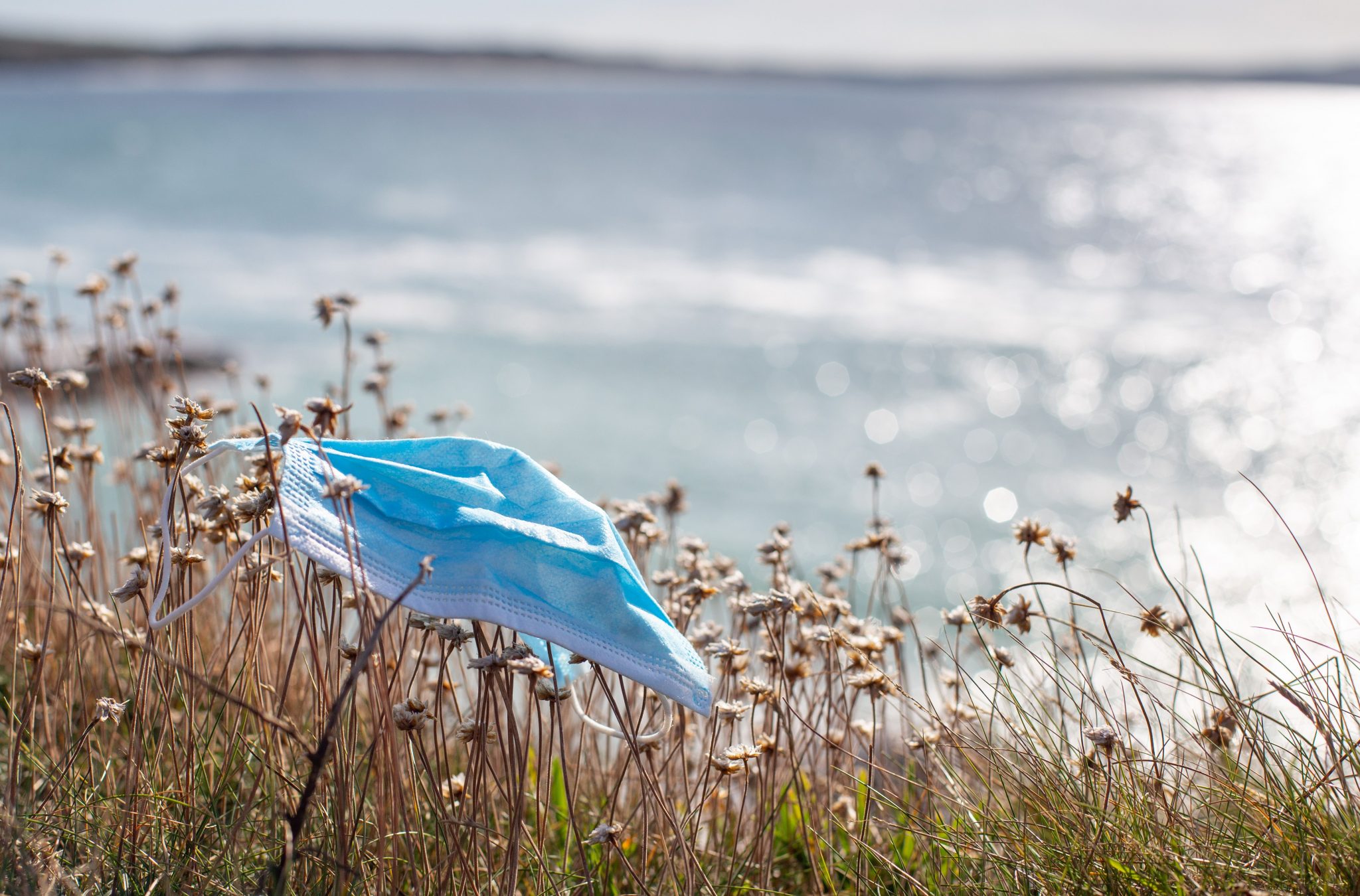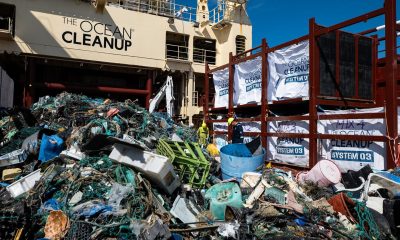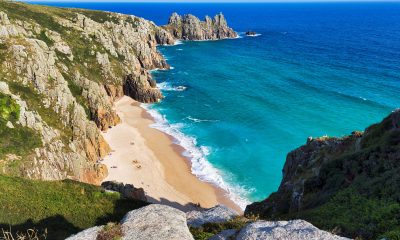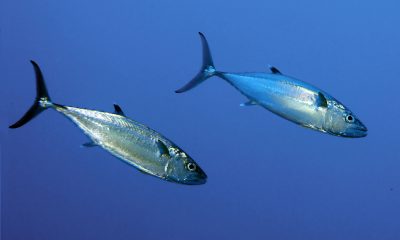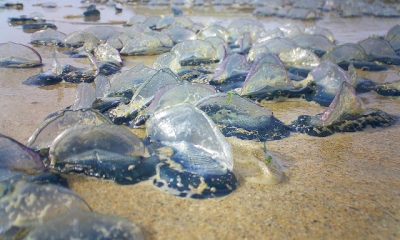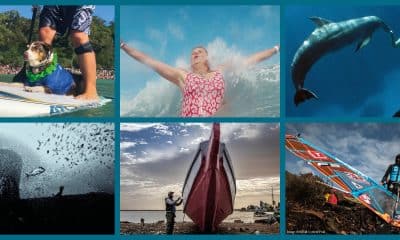Marine Life & Conservation
Results of Marine Conservation Society’s Great British Beach Clean show concerning volume of PPE litter

 Charity’s annual Great British Beach Clean results are word of warning on PPE pollution
Charity’s annual Great British Beach Clean results are word of warning on PPE pollution
This year, the Marine Conservation Society’s annual Great British Beach Clean, supported by players of People’s Postcode Lottery, took place against the backdrop of the Coronavirus pandemic. As the charity introduced measures to ensure beaches could still be cleaned and surveyed in accordance with guidelines, it also asked volunteers to record face masks and plastic gloves for the first time.
The charity’s citizen science project gives an insight into the most common forms of litter blighting UK shores. This year’s results are supported by inland data collected by volunteers embarking on the charity’s Source to Sea Litter Quest.
The results from this year’s Great British Beach Clean show a concerning, but perhaps predictable, presence of PPE litter. Face masks and gloves were found on almost 30% of beaches cleaned by Marine Conservation Society volunteers over the week-long event. The inland Source to Sea Litter Quest data shows a similarly worrying presence of masks and gloves, with more than two thirds (69%) of litter picks finding PPE items.
Lizzie Prior, Great British Beach Clean Coordinator at the Marine Conservation Society said: “The amount of PPE our volunteers found on beaches and inland this year is certainly of concern. Considering mask wearing was only made mandatory in shops in England in late July, little more than three months before the Great British Beach Clean, the sharp increase in PPE litter should be a word of warning for what could be a new form of litter polluting our beaches in the future.”
Like many other single-use items, disposable face masks and gloves pose a threat to wildlife on land and at sea. Marine animals could mistake face masks and gloves for prey, filling their stomachs with materials which will not break down and could prove to be fatal. Animals also risk being tangled in the straps of face masks, with seabirds’ feet pictured recently being wrapped in the elastic strings.
Drinks litter continues to be found on UK beaches, with an average of 30 drinks containers, caps and lids being found per 100m of beach surveyed this year. Inland, almost all litter picks (99%) found drinks litter. This continued blight to the UK’s shores and inland spaces illustrates the urgent need for governments to follow Scotland’s lead and introduce an all-inclusive Deposit Return Scheme.
Dr Laura Foster, Head of Clean Seas at the Marine Conservation Society said: “This year’s Great British Beach Clean data, in addition to the Source to Sea Litter Quest data, shows just how crucial it is that Wales, England and Northern Ireland follow in the footsteps of Scotland and urgently introduce an all-inclusive Deposit Return Scheme.
“Despite lockdown, with many of us spending more time at home, littering in public spaces has continued unabated. Almost every single local litter pick found at least one drinks container, which is incredibly concerning. An effective Deposit Return Scheme would take the UK one step closer to a circular economy model and drastically reduce the volume of single-use pollution in the UK’s streets, parks and on our beaches.”
The top 5 most common litter items on UK beaches in 2020 (average per 100m of beach surveyed):
- Plastic and polystyrene pieces (0-50cm) – 167.2
- Plastic and polystyrene caps and lids – 19.7
- Wet wipes – 17.7
- Cigarette stubs – 16.2
- Plastic string – 15.8
For more information about the Marine Conservation Society’s Great British Beach Clean and year round Beachwatch programme, please visit the charity’s website.
Blogs
The Ocean Cleanup Breaks 10,000,000 KG Barrier

The Ocean Cleanup, the global non-profit project, has removed a verified all-time total of ten million kilograms (22 million lbs.) of trash from oceans and rivers around the world – approximately the same weight as the Eiffel Tower.
To complete its mission of ridding the oceans of plastic, The Ocean Cleanup uses a dual strategy: cleaning up the Great Pacific Garbage Patch (GPGP) to remove the plastic already afloat in the oceans, while stopping the flow of plastic from the world’s most polluting rivers.
Through cleaning operations in the GPGP and in rivers in eight countries, the cumulative total of trash removed has now surpassed ten million kilograms. This milestone demonstrates the acceleration of The Ocean Cleanup’s impact, while underlining the astonishing scale of the plastic pollution problem and the need for continued support and action.
While encouraging for the mission, this milestone is only a staging point: millions more tons of plastic still pollute our oceans and The Ocean Cleanup intends to continue learning, improving and innovating to solve this global catastrophe.
This announcement comes as governments from around the world meet to continue negotiations to develop a new legally binding instrument to end plastic pollution at INC4 in Ottawa, Canada. Representatives of The Ocean Cleanup will be in attendance and the organization will be urging decision-makers to collaborate towards a comprehensive and ambitious global treaty which addresses plastic at all stages of its life cycle and in all marine environments worldwide, including in areas beyond national jurisdiction.
It is encouraging to see that the need for remediation is reflected in the various options for potential treaty provisions. It is essential that the final treaty contains clear targets for the remediation of legacy plastic pollution, and reduction of riverine plastic emissions.
Tackling plastic pollution requires innovative and impactful solutions. The treaty should therefore incentivize the innovation ecosystem by fostering innovations that make maximal use of data, technology and scientific knowledge – such as those designed and deployed by The Ocean Cleanup.
‘After many tough years of trial and error, it’s amazing to see our work is starting to pay off – and I am proud of the team who has brought us to this point.’ said Boyan Slat, Founder and CEO of The Ocean Cleanup. ‘While we still have a long way to go, our recent successes fill us with renewed confidence that the oceans can be cleaned.’
The Ocean Cleanup was founded in 2013 and captured its first plastic in 2019, with the first confirmed catch in the GPGP coming soon after the deployment of Interceptor 001 in Jakarta, Indonesia. After surpassing one million kilograms of trash removed in early 2022, the non-profit project has since progressed to the third iteration of its GPGP cleaning solution, known as System 03, and a network of Interceptors currently covering rivers in eight countries, with more deployments set for 2024.
About The Ocean Cleanup
The Ocean Cleanup is an international non-profit organization that develops and scales technologies to rid the world’s oceans of plastic. They aim to achieve this goal through a dual strategy: stemming the inflow via rivers and cleaning up the legacy plastic that has already accumulated in the ocean. For the latter, The Ocean Cleanup develops large-scale systems to efficiently concentrate the plastic for periodic removal. This plastic is tracked and traced through DNV’s chain of custody model to certify claims of origin when recycling it into new products. To curb the tide via rivers, The Ocean Cleanup has developed Interceptor™ solutions to halt and extract riverine plastic before it reaches the ocean. Founded in 2013 by Boyan Slat, The Ocean Cleanup now employs a broadly multi-disciplined team of approximately 140. The foundation is headquartered in Rotterdam, the Netherlands.
For more information, visit: theoceancleanup.com and follow @theoceancleanup on social media.
Marine Life & Conservation
Steve Backshall to headline Shark Trust’s flagship event: For the Love of Sharks

Join a host of amazing, shark loving, speakers including Steve Backshall and the Shark Trust team for an evening celebrating shark conservation at the Royal Geographical Society in London this November.
Date: 29th November 2024
Time: 6-10pm
Location: Royal Geographical Society, London
Tickets: https://www.sharktrust.org/Event/flos24
The event will be a celebration of all things shark. Those lucky enough to get hold of tickets will hear from engaging guest speakers with a passion for sharks.
The line-up includes (*subject to change if unforeseen circumstances arise)
Steve Backshall: One of television’s busiest presenters, BAFTA award-winning wildlife expert Steve has been passionate about the wild world ever since he was young.
Steve’s impressive TV career has taken him all around the world, investigating a wide array of species and environments. Steve has filmed over 100 hours of children’s wildlife programmes with the BAFTA award winning Deadly 60 franchise and recently, with Sky Nature, for his new series ‘Whale with Steve Backshall’. He has been a patron for the Shark Trust for 10 years.
Simon Rogerson: is a photojournalist specialising in natural history, diving and the sea.
He is editor of SCUBA magazine, the official journal of the British Sub-Aqua Club. Simon started his career as a crime reporter but gravitated towards his ‘less depressing’ interest in underwater exploration, joining the staff of DIVE magazine in 1999. In 2005 he was named ‘Editor of the Year’ in the PPA’s Independent Publishing Awards. Simon also works as a freelance writer, contributing frequently to the Sunday Times and Telegraph, in addition to BBC Wildlife, Esquire, and a host of international diving magazines. He is the author of a book, Dive Red Sea, published by Ultimate Sports. Now based in Berkshire, Simon has been a Patron of the Shark Trust for 20 years.
More speakers to be announced soon. Head to the Shark Trust website to learn more.
The evening will also allow guests the final chance to see the Oceanic 31, shark art exhibition. Some of the artwork will be auctioned/raffled at the event, while the rest will be auctioned online to raise money for the Shark Trust Oceanic Programme.
For the Love of Sharks is an evening with something for everyone who is interested and fascinated by sharks. Join the Shark Trust, their Patrons, Trustees and Staff, along with a host of supporters for this celebration of shark conservation.
For more information or to buy a ticket: https://www.sharktrust.org/Event/flos24
-

 News3 months ago
News3 months agoCapturing Critters in Lembeh Underwater Photography Workshop 2024: Event Roundup
-

 Marine Life & Conservation Blogs3 months ago
Marine Life & Conservation Blogs3 months agoCreature Feature: Swell Sharks
-

 Blogs2 months ago
Blogs2 months agoMurex Resorts: Passport to Paradise!
-

 Gear Reviews4 weeks ago
Gear Reviews4 weeks agoGEAR REVIEW – Revolutionising Diving Comfort: The Sharkskin T2 Chillproof Suit
-

 Blogs3 months ago
Blogs3 months agoDiver Discovering Whale Skeletons Beneath Ice Judged World’s Best Underwater Photograph
-

 News3 months ago
News3 months agoPADI Teams Up with Wellness Brand Neuro to Drive Ocean Change and Create a Blue State of Mind
-

 Gear Reviews3 months ago
Gear Reviews3 months agoGear Review: Oceanic+ Dive Housing for iPhone
-

 News3 months ago
News3 months agoWorld’s Best Underwater Photographers Unveil Breathtaking Images at World Shootout 2023


